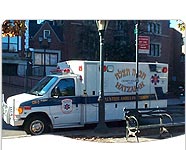 
Lifestyle Intervention Cuts Cardiac Risk Without Drug Therapy
(Reuters Health) In a new study, a 12-week lifestyle intervention helped an ethnically diverse group of adults with hypertension,
hyperlipidemia, and hyperglycemia reach their goal risk factor levels without using drug therapy.
These results "refute the notion that intensive lifestyle intervention is not worth the effort," lead author Dr. Neil F. Gordon,
from St. Joseph's/Candler Health System in Savannah, Georgia, and colleagues report in the December 15th issue of The American
Journal of Cardiology.
The results are based on a study of 2390 adults who participated in the lifestyle program involving an initial health assessment
followed by the generation of risk factor goals and lifestyle changes designed to achieve these goals.
Participation in the program was associated with a significant improvement in blood pressure, cholesterol profile, glucose levels,
and body weight among subjects with abnormal values at baseline (p = 0.05 or lower for all). Moreover, in a subset of 700 patients
with no know atherosclerotic cardiovascular disease, the intervention was linked to a significant reduction in Framingham 10-year risk
scores for heart disease.
"Therapeutic lifestyle changes can generally be implemented less expensively than most medications and, unlike single-drug
therapy, favorably affect multiple risk factors," the authors point out. Thus, the current findings could have important implications for
healthcare payers, which often do not reimburse for such lifestyle interventions, they add.
Am J Cardiol 2004;94:1558-1561.
The above is for general informational purposes only. Always consult your
physician regarding specific medical issues and call Hatzalah or your local
ambulance service in the event of an emergency.
Back to Digest Index
|









